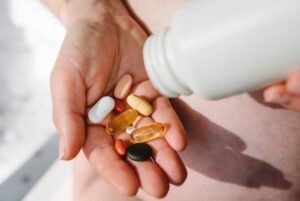 Simply put, yes.
Simply put, yes.
Probiotics that are thought to be anti-diabetic, can improve biomarkers of inflammation, and lower fasting blood glucose include:
- Lactobacillus
- Bifidobacterium
- Akkermansia muciniphilia (touted to improve metabolic functions)
There are many studies in journals on this subject, most of them in the past few years. We know disease processes have different flora in the gut: Crohns, Multiple Sclerosis, heart disease risk, and diabetes — these patients have different gut flora than “normal” flora. So which came first? Did the gut flora lead to the disease? Or did disease change the gut flora?
And the big question: can you change your gut flora with probiotics? Which ones?
In a study called “A New Medical Probiotic Formulation for the Nutritional Management of Type 2 Diabetes,” Clinical Diabetes (Fall 2022), researchers looked at Pendulum Glucose Control, which has a proprietary probiotic blend of Clostridium butyricum, clostridium beijerinckii, anaerobutyricum hallii, and bifidobarcterium infantis.
- This study involved 76 people with Type 2 diabetes.
- They argue that this product restores the body’s ability to produce butyrate and restores the mucin lining of the gut.
- Butyrate binds to gut mucosa receptors and stimulates the release of GLP-1 (the agonist used in semaglutide). It is thought that this helps make you feel full, reduces appetite, improves insulin secretion, and reduces liver glucose output.
- They tried treating with three strains, and with five strains. They found that 5 strains had a statistically significant reduction in total glucose area under the curve when compared with a placebo. In an A1C test, there was a nonsignificant reduction — the improvement in this treatment is thought to be in the glucose surge after eating, not your fasting level.
- This brand is not cheap — it is $215 for a 30-day supply.
In a prior 2015 study, “Effect of Probiotics on Glycemic Control: A Systematic Review and Meta Analysis of Randomized Controlled Trials“:
- This looked at many studies, totalling n =1105; fasting blood glucose, n =788 fasting plasma insulin, and homeostasis model assessment of insulin resistance n = 635.
- They found probiotic consumption compared with a placebo significantly reduced fasting glucose, fasting plasma insulin, and insulin resistance.
- The ratio bacteroidestes species in Type 2 diabetes correlates with plasma glucose.
- The lowering of plasma glucose was seen in those with diabetes more than non-diabetic patients.
- Longer trials showed more improvement, though some showed improvement at 3 weeks.
We bring this up as your health is multifactorial. When discussing diabetes, inflammation, cardiac risk, and weight gain, your gut flora is important. What your flora is currently varies from person to person.
You can get naturally improved gut flora from fermented foods like sauerkraut, kombucha, and pickles. It is also found in active culture yogurts. But if you want to try to control it more, a probiotic may be useful.
We at Biohackr will keep focusing on this and will find the best intersection of probiotic quality and cost.